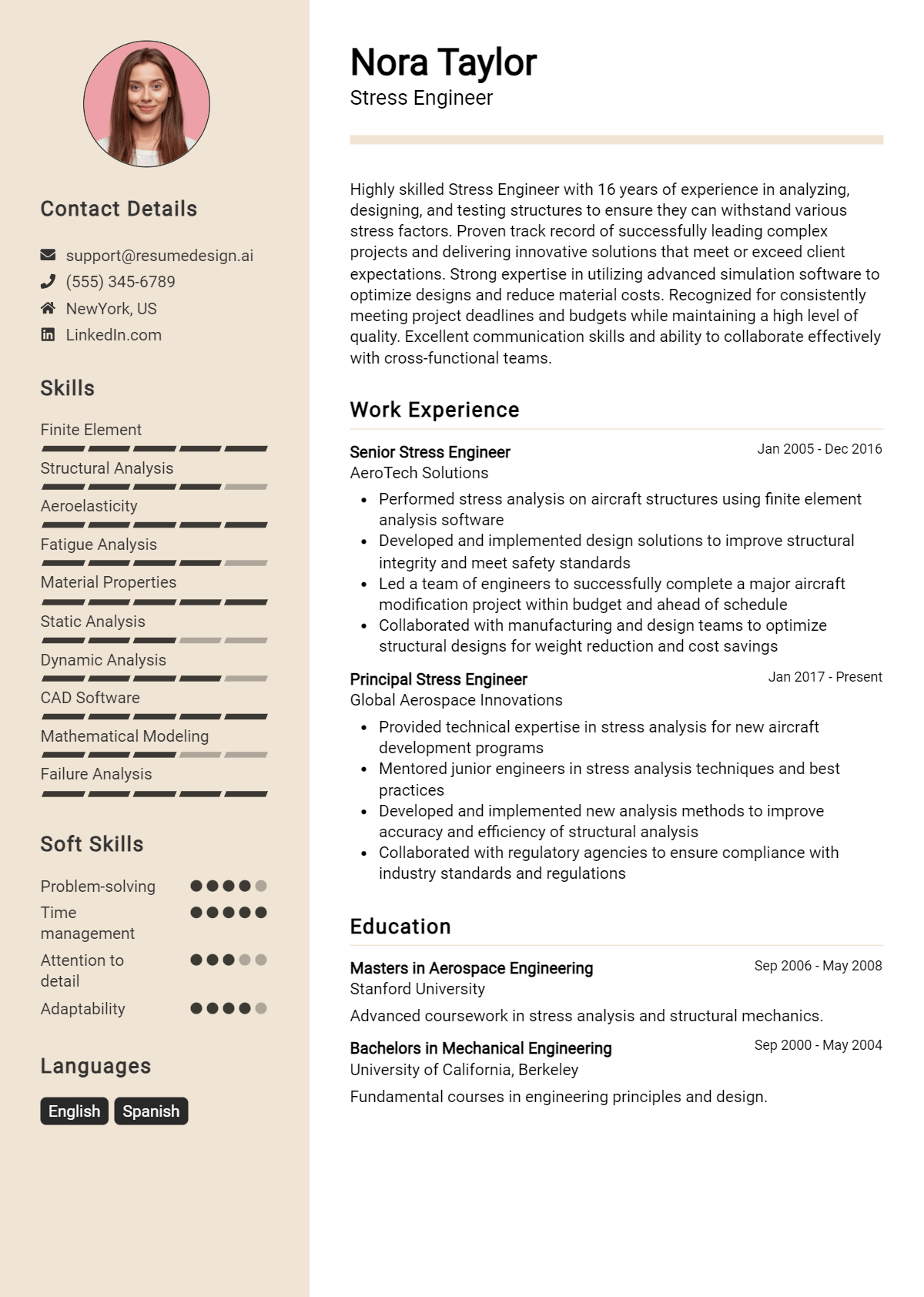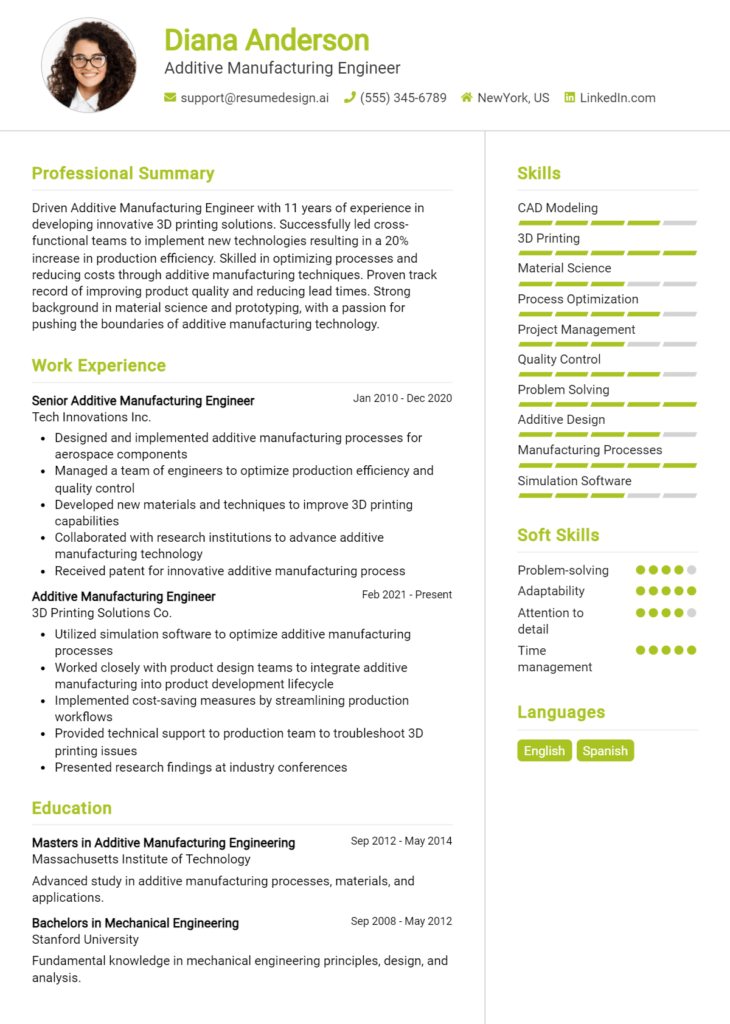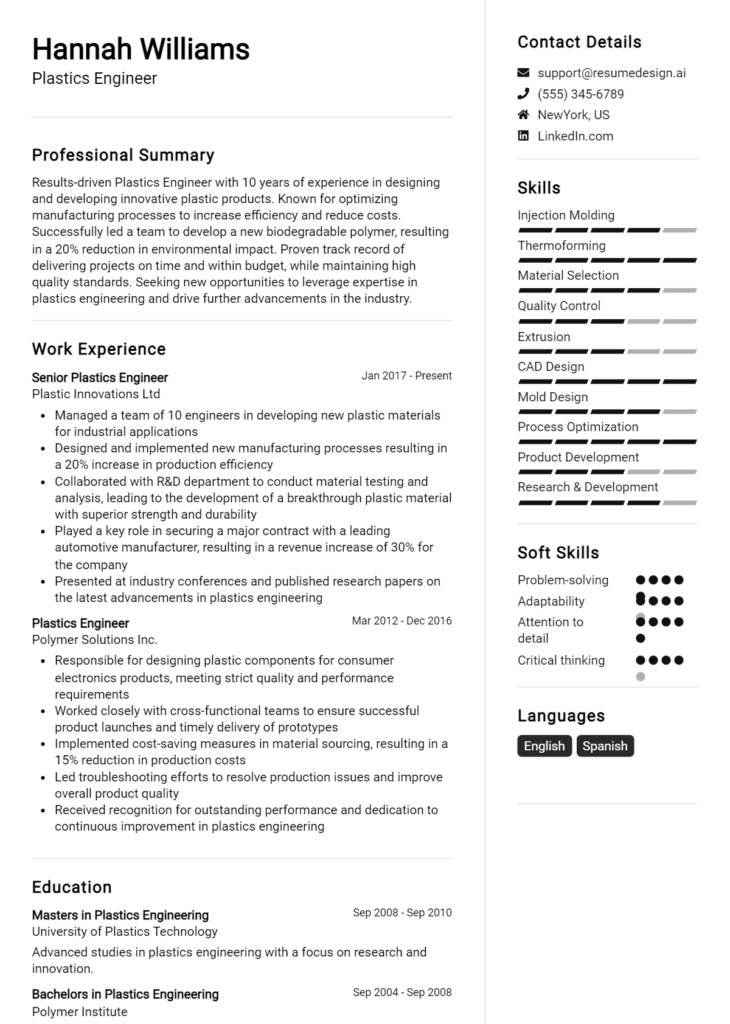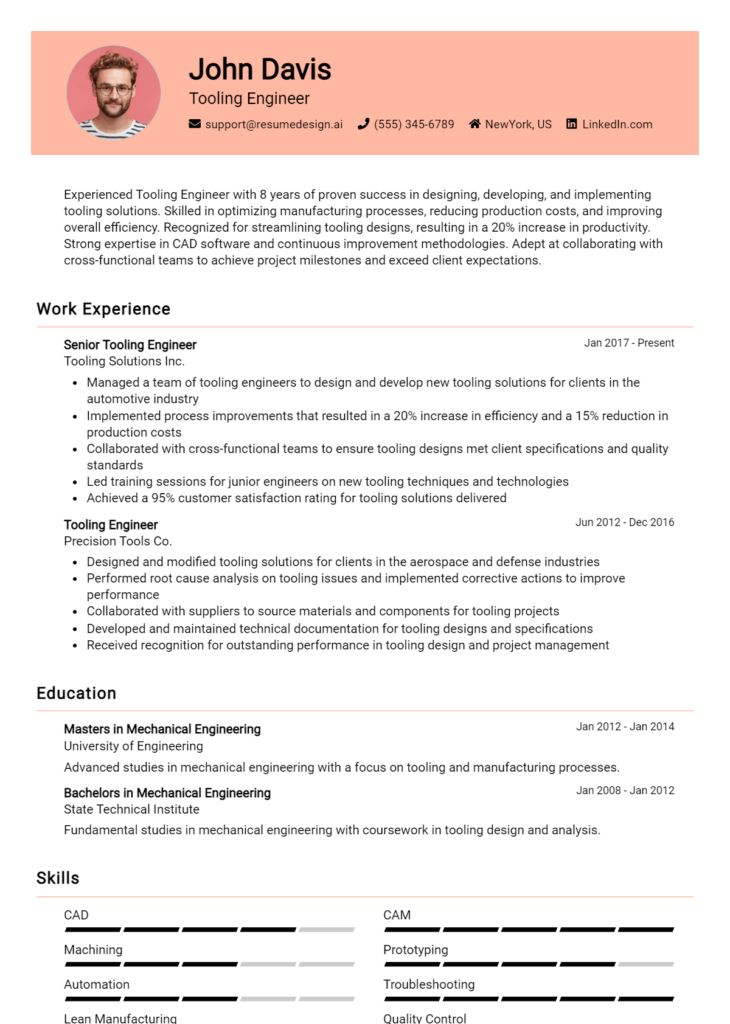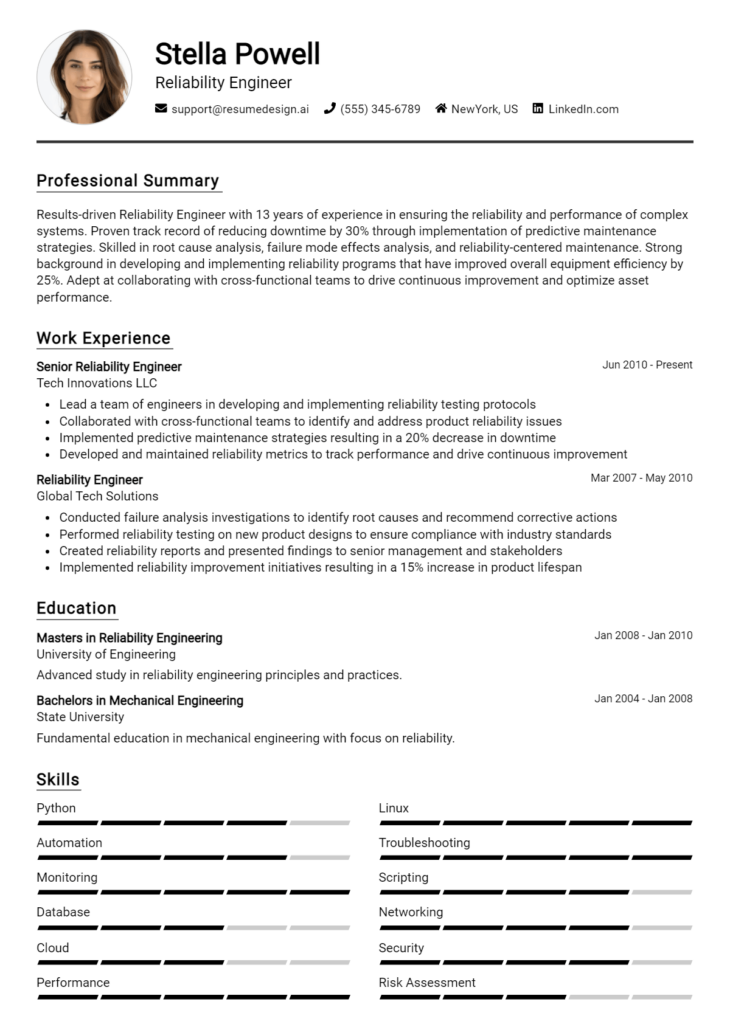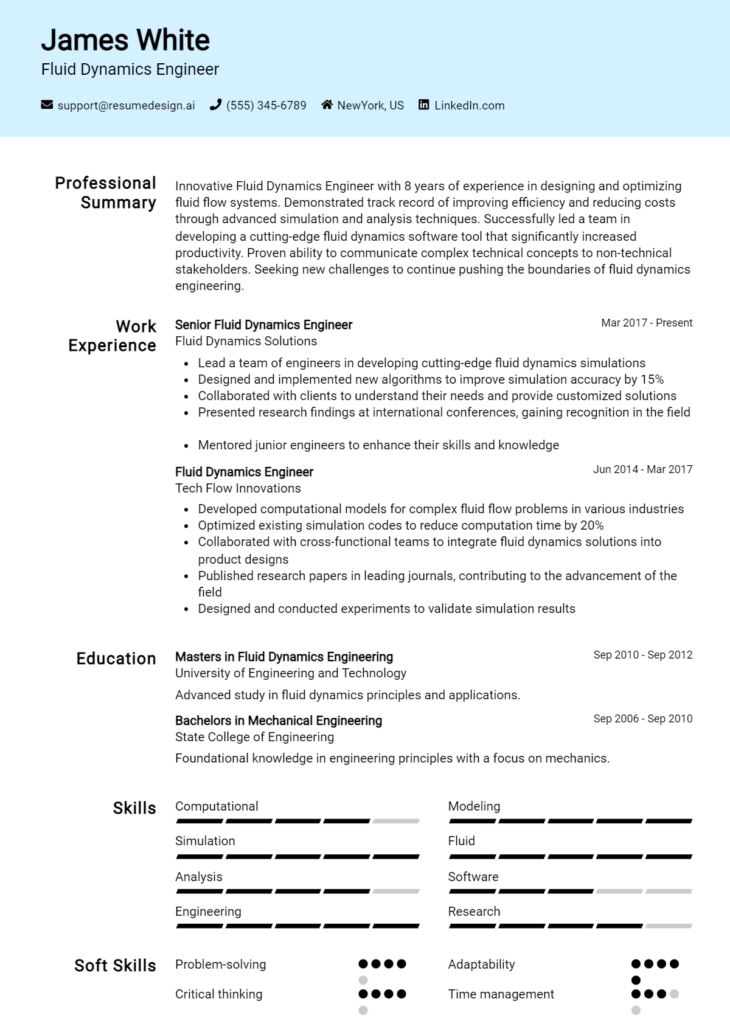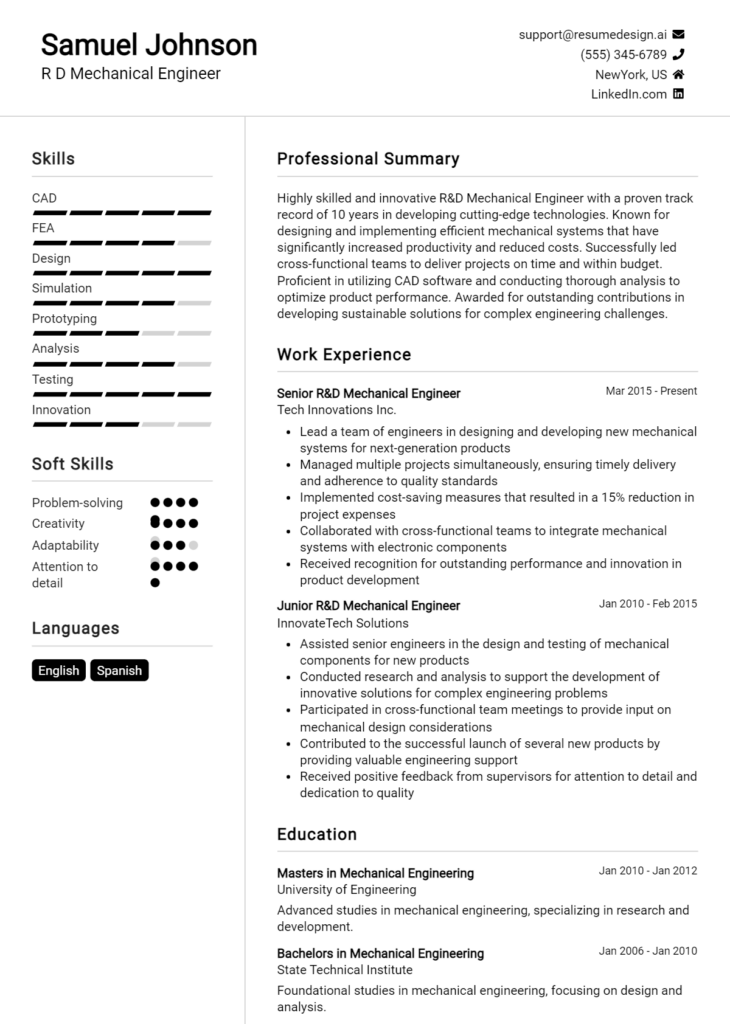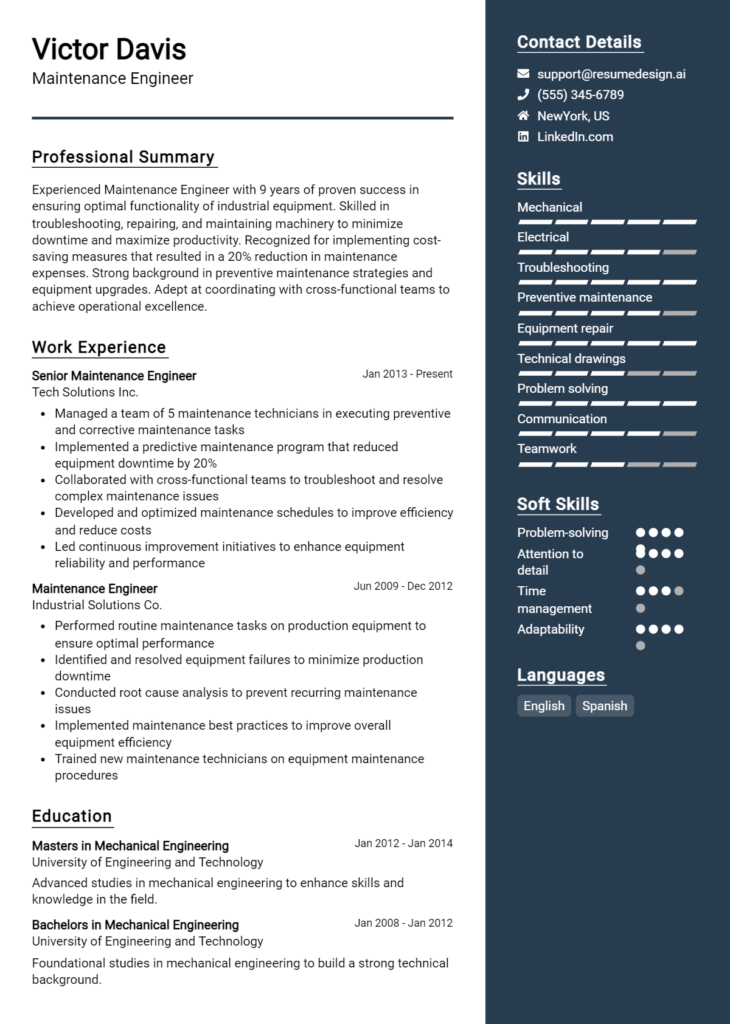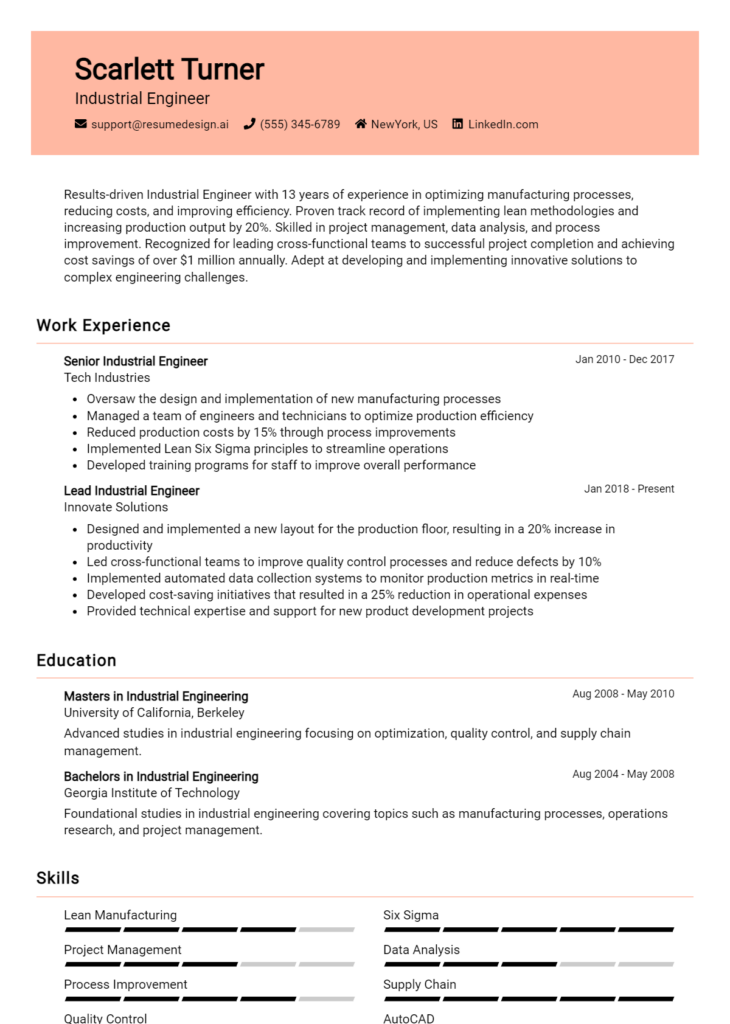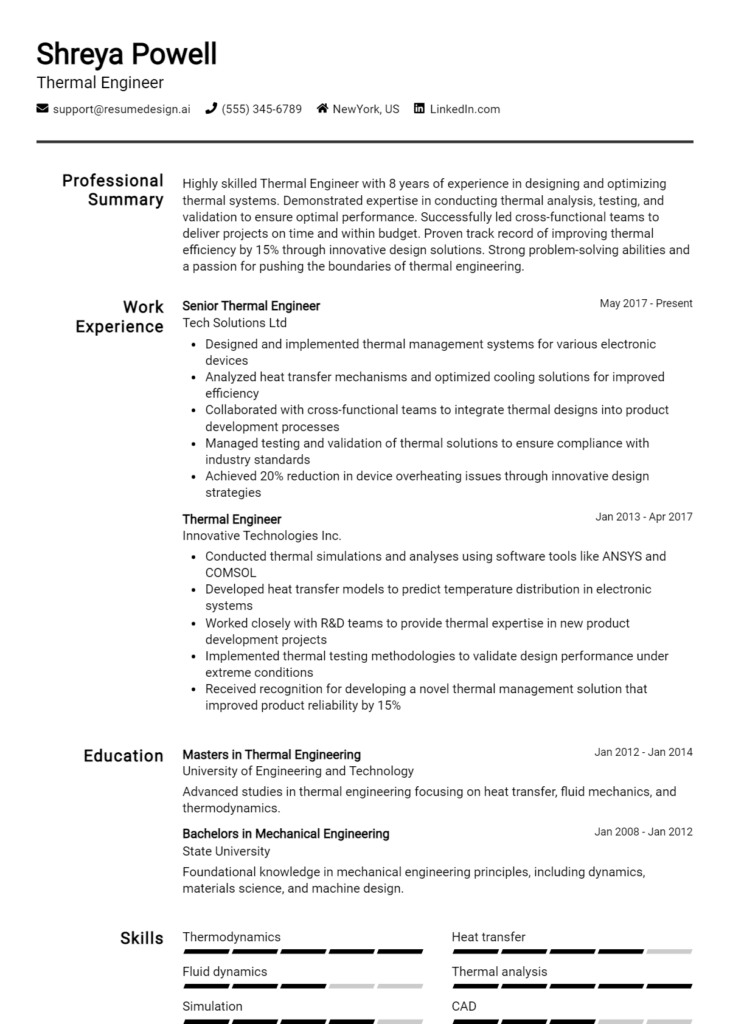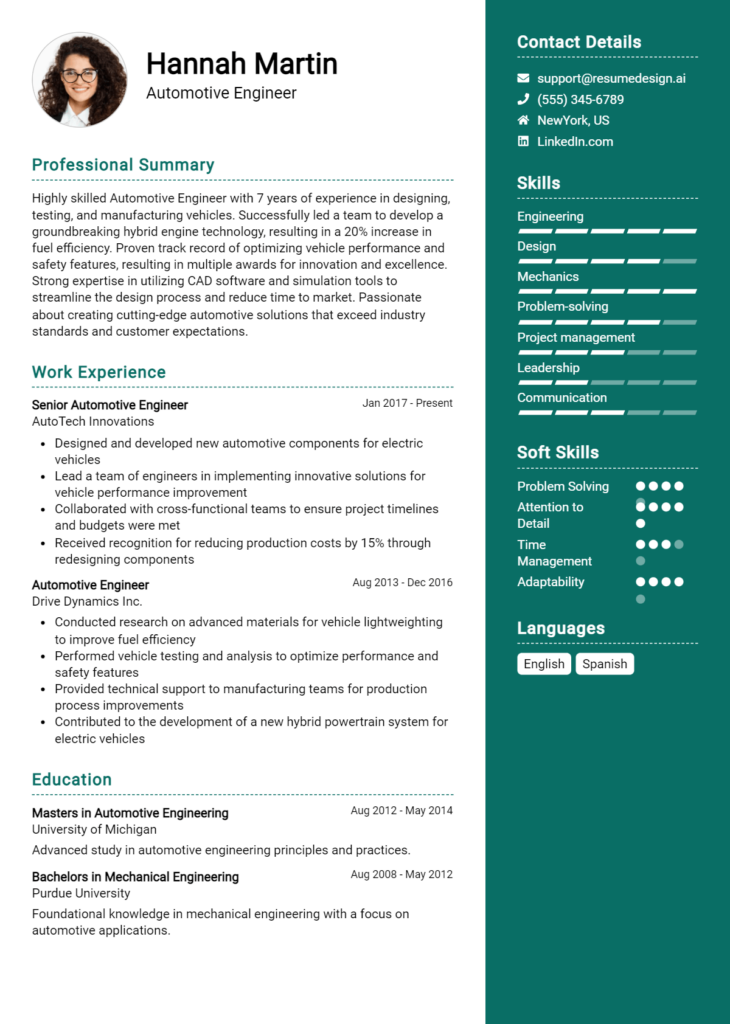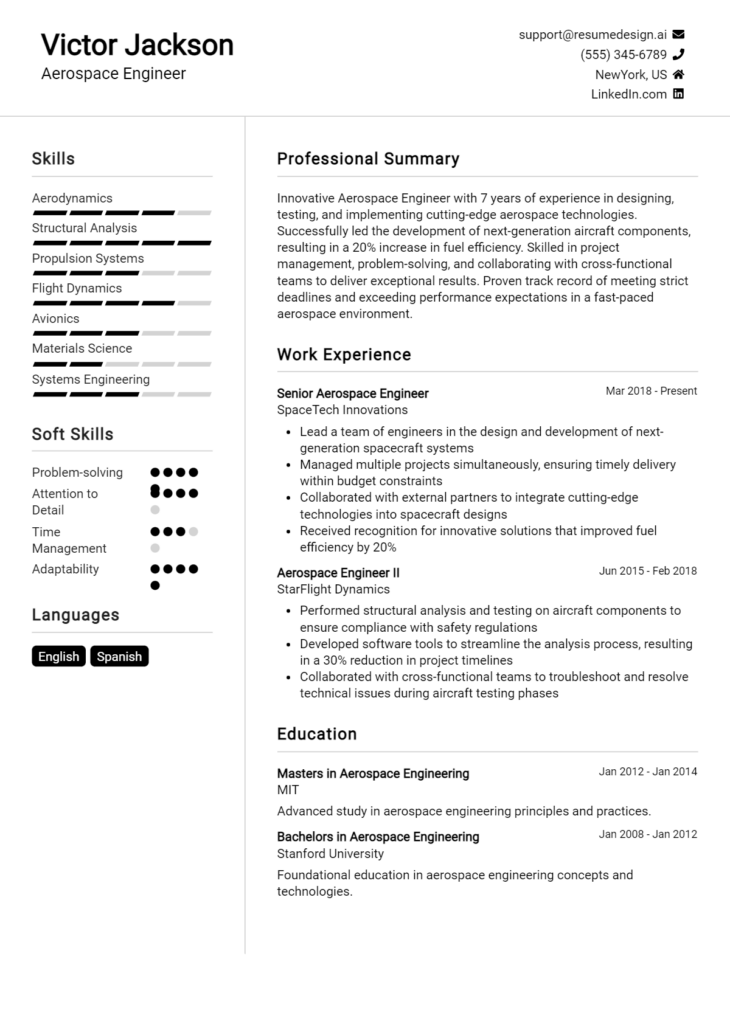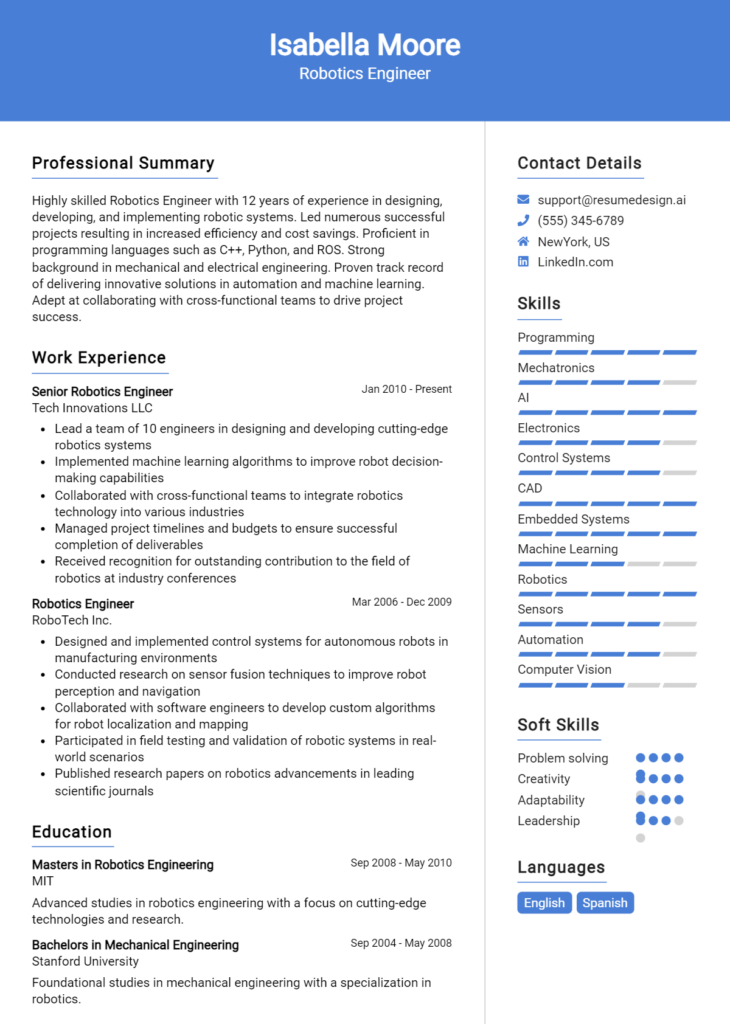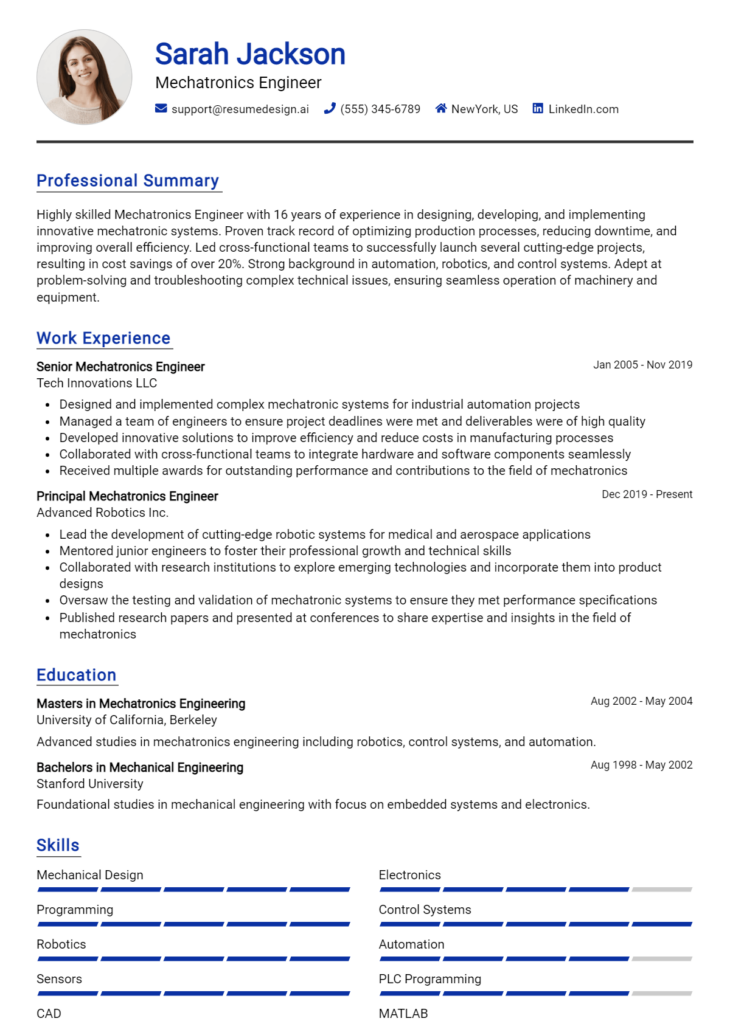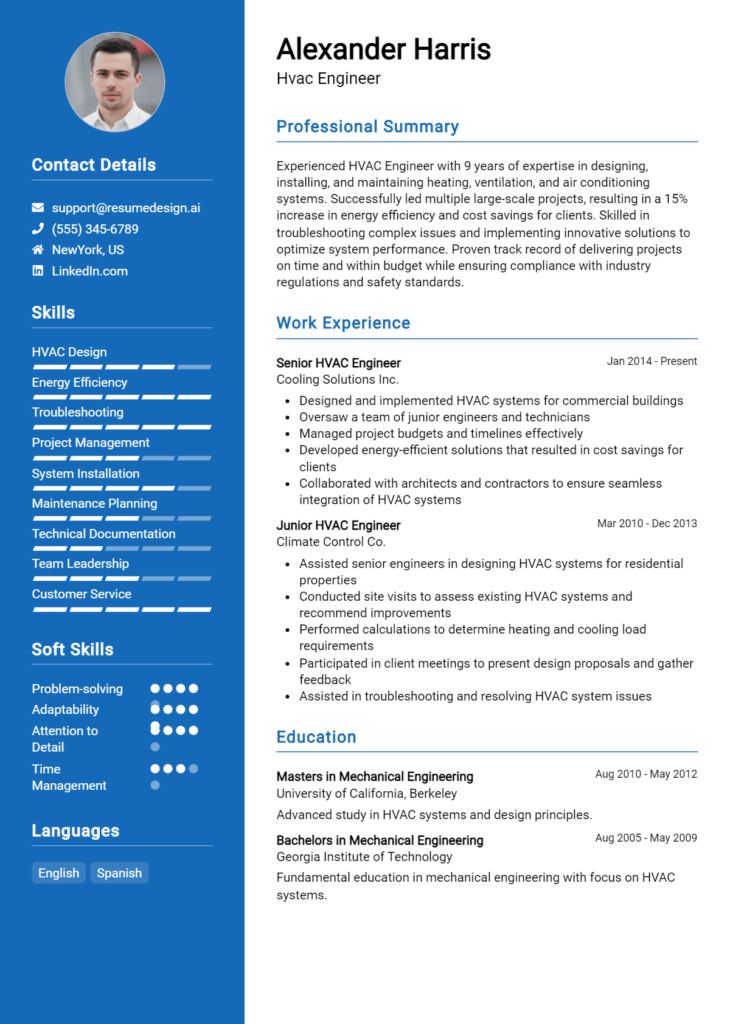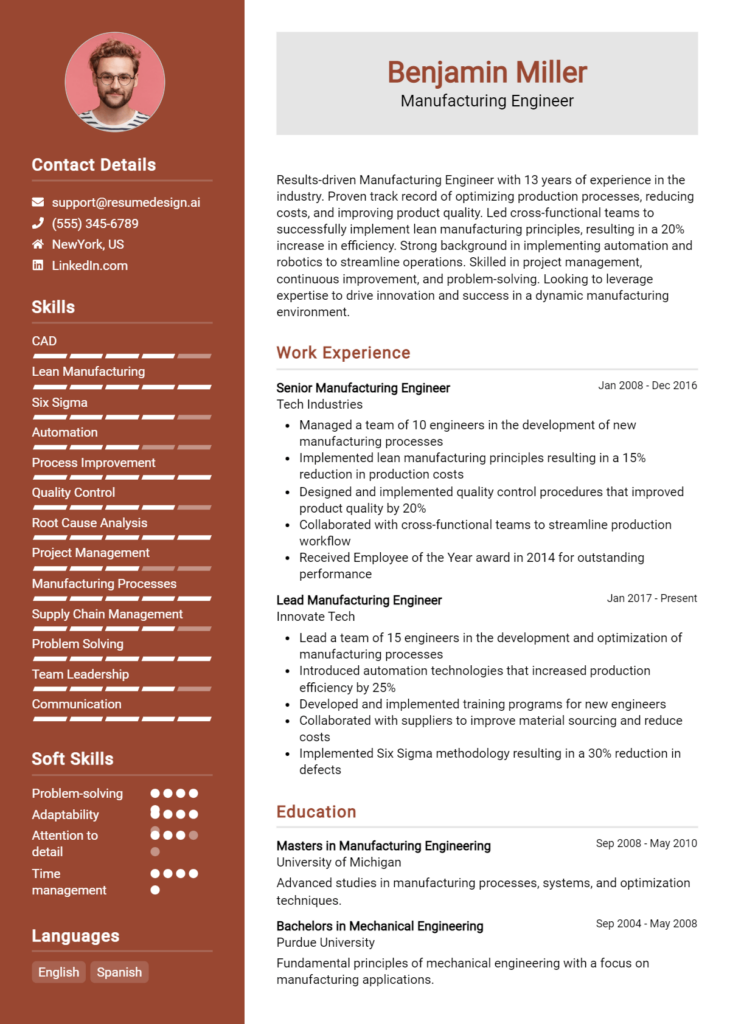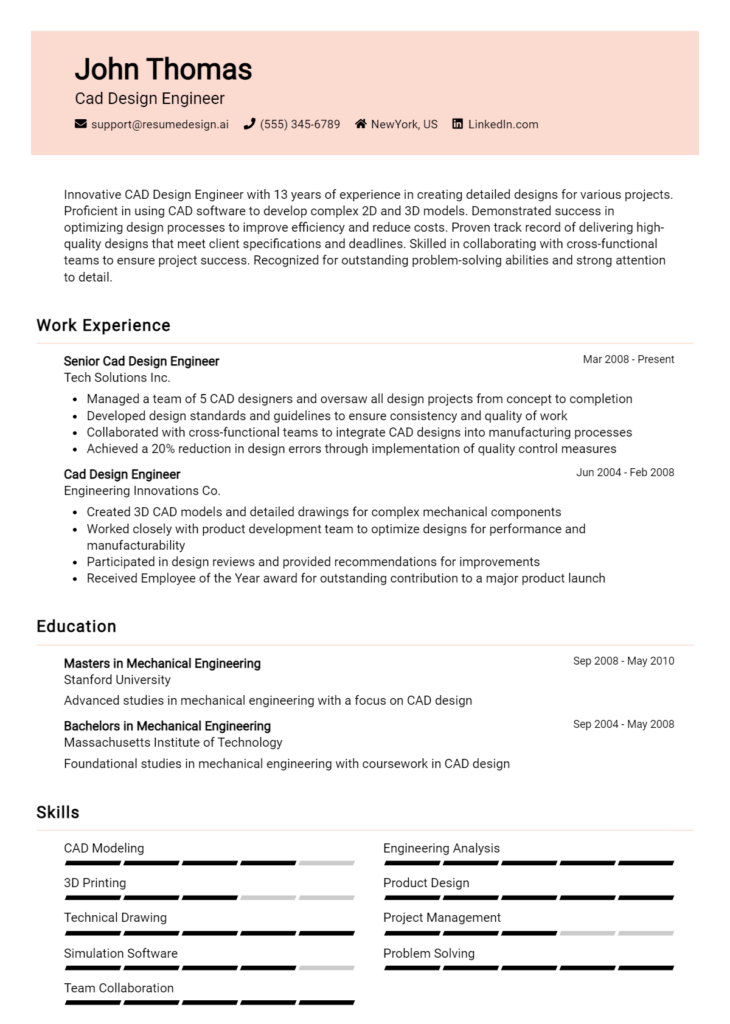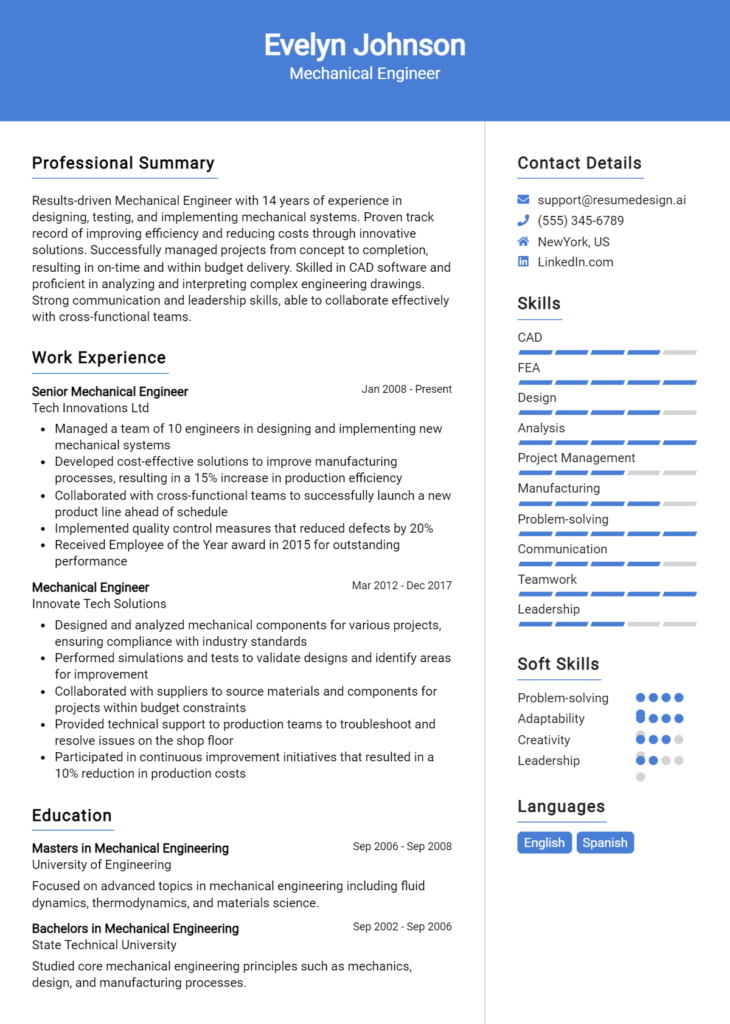Stress Engineer Core Responsibilities
A Stress Engineer plays a pivotal role in ensuring the structural integrity and safety of designs across various projects. Key responsibilities include conducting stress analysis, collaborating with design and manufacturing teams, and troubleshooting technical issues. Successful Stress Engineers possess strong analytical, technical, and problem-solving skills, allowing them to bridge gaps between engineering, operations, and quality assurance. These competencies are essential for meeting organizational goals, and a well-structured resume can effectively highlight these qualifications, enhancing career opportunities.
Common Responsibilities Listed on Stress Engineer Resume
- Conducting detailed stress analysis of structural components.
- Collaborating with design engineers to optimize product designs.
- Performing finite element analysis (FEA) to predict failure modes.
- Preparing technical reports and documentation for project reviews.
- Identifying and resolving engineering issues during the product lifecycle.
- Ensuring compliance with industry standards and regulations.
- Participating in cross-functional teams to enhance product performance.
- Developing and implementing design validation tests.
- Providing support during manufacturing and assembly processes.
- Utilizing simulation software to evaluate material behavior.
- Monitoring and analyzing testing results for quality assurance.
- Maintaining up-to-date knowledge of engineering best practices.
High-Level Resume Tips for Stress Engineer Professionals
In the competitive field of engineering, a well-crafted resume is essential for Stress Engineer professionals aiming to make a strong first impression on potential employers. Your resume is often the initial point of contact, serving as a reflection of your skills, achievements, and professional journey. It is crucial to create a document that not only highlights your technical expertise but also showcases your problem-solving abilities and contributions to past projects. This guide will provide practical and actionable resume tips specifically tailored for Stress Engineer professionals, ensuring your resume stands out in a crowded job market.
Top Resume Tips for Stress Engineer Professionals
- Tailor your resume to the specific job description by incorporating relevant keywords that align with the employer's requirements.
- Highlight your experience with stress analysis tools and software, such as ANSYS, NASTRAN, or Abaqus, to demonstrate technical proficiency.
- Quantify your achievements by including specific metrics, such as percentage reductions in stress or improvements in design efficiency.
- Showcase your educational background, including any specialized degrees or certifications relevant to stress engineering.
- Include a section dedicated to relevant projects, detailing your role, the challenges faced, and the solutions implemented.
- Emphasize your collaboration skills by mentioning experiences working in multidisciplinary teams and cross-functional projects.
- Keep your resume concise, ideally one page, focusing on the most pertinent information about your career.
- Utilize action verbs to convey your contributions dynamically, such as "analyzed," "designed," or "optimized."
- Incorporate industry-specific skills such as fatigue analysis, material properties evaluation, and structural integrity assessments.
- Proofread for grammatical accuracy and clarity to ensure a professional presentation that reflects your attention to detail.
By implementing these tips, you can significantly increase your chances of landing a job in the Stress Engineer field. A tailored resume that effectively showcases your skills and achievements will not only catch the eye of recruiters but also position you as a strong candidate capable of addressing the complex challenges faced in this specialized area of engineering.
Why Resume Headlines & Titles are Important for Stress Engineer
In the competitive field of engineering, particularly for Stress Engineers, a well-crafted resume headline or title serves as an essential tool for capturing the attention of hiring managers. A strong headline succinctly summarizes a candidate's key qualifications and expertise, providing an immediate insight into their suitability for the role. It should be concise, relevant, and directly aligned with the job being applied for, ensuring that the candidate stands out in a crowded applicant pool. By effectively conveying core competencies and areas of specialization, a compelling resume headline can make a significant impact, prompting hiring managers to delve deeper into the resume.
Best Practices for Crafting Resume Headlines for Stress Engineer
- Keep it concise: Aim for a headline that is no longer than 10-15 words.
- Be specific: Use industry-related terms and phrases that highlight your expertise in stress analysis.
- Highlight key strengths: Focus on your most relevant skills, certifications, or accomplishments.
- Use action-oriented language: Start with strong action verbs to convey confidence and capability.
- Tailor to the job description: Align your headline with the specific requirements and keywords of the job posting.
- Include quantifiable achievements: If possible, incorporate numbers or statistics to showcase your impact.
- Maintain professionalism: Ensure the tone and wording reflect industry standards and professionalism.
- Avoid clichés: Steer clear of overused phrases that may dilute the impact of your headline.
Example Resume Headlines for Stress Engineer
Strong Resume Headlines
"Experienced Stress Engineer Specializing in Finite Element Analysis and Structural Integrity"
“Certified Stress Engineer with 10+ Years in Aerospace Applications and Design Optimization”
“Results-Driven Stress Engineer Focused on Innovative Solutions and Risk Mitigation”
“Dynamic Stress Engineer with Proven Track Record in Multidisciplinary Team Collaboration”
Weak Resume Headlines
“Engineer Looking for a Job”
“Stress Engineer with Some Experience”
“Professional Seeking Opportunities in Engineering”
Strong resume headlines are effective because they are specific, relevant, and highlight the candidate's unique strengths and experiences in the field of stress engineering. They showcase the candidate’s qualifications in a way that immediately resonates with hiring managers looking for particular skills and achievements. Conversely, weak headlines fail to impress because they lack specificity and do not convey any real insight into the candidate’s expertise or value, making them easy to overlook in a competitive job market.
Writing an Exceptional Stress Engineer Resume Summary
A well-crafted resume summary is crucial for a Stress Engineer, as it serves as the first impression for hiring managers. This brief yet powerful section quickly highlights the candidate's key skills, relevant experience, and notable accomplishments, making it easier for recruiters to gauge their fit for the role. A strong summary should be concise, impactful, and tailored to the specific job the candidate is applying for, ensuring that it resonates with the needs of the employer and captures their attention immediately.
Best Practices for Writing a Stress Engineer Resume Summary
- Quantify achievements: Use numbers and metrics to demonstrate the impact of your work.
- Focus on skills: Highlight key technical and analytical skills that are relevant to the stress engineering field.
- Tailor the summary: Customize your summary for each job application by incorporating specific keywords from the job description.
- Be concise: Keep the summary to 3-5 sentences, ensuring clarity and emphasis on essential information.
- Showcase relevant experience: Highlight past positions or projects that directly relate to the role of a Stress Engineer.
- Include certifications: Mention any relevant certifications or training that enhance your qualifications.
- Use action verbs: Start sentences with dynamic verbs to convey a sense of proactivity and impact.
- Convey passion: Express enthusiasm for the field of stress engineering to demonstrate genuine interest.
Example Stress Engineer Resume Summaries
Strong Resume Summaries
Driven Stress Engineer with over 8 years of experience in aerospace applications, known for leading structural analysis projects that improved material efficiency by 25%, resulting in significant cost savings for the company.
Detail-oriented Stress Engineer adept at conducting finite element analysis (FEA) and computational fluid dynamics (CFD) simulations, contributing to a 15% reduction in product failure rates through rigorous testing and validation processes.
Accomplished Stress Engineer with a proven track record in optimizing design processes for automotive components. Spearheaded a project that enhanced load capacity by 30% while adhering to strict safety standards and timelines.
Weak Resume Summaries
Experienced engineer looking for a job in stress engineering.
Stress Engineer with knowledge of various engineering principles and a desire to work in a challenging environment.
The examples provided illustrate the stark differences between strong and weak resume summaries. Strong summaries effectively quantify achievements and highlight specific skills relevant to the Stress Engineer role, demonstrating the candidate's direct impact and expertise. In contrast, weak summaries are vague and generic, failing to provide concrete information about the candidate's qualifications and accomplishments, which may leave hiring managers unimpressed.
Work Experience Section for Stress Engineer Resume
The work experience section of a Stress Engineer resume is crucial as it highlights a candidate's technical skills, project management abilities, and their capability to deliver high-quality products under pressure. This section not only showcases the applicant's direct experience but also demonstrates their proficiency in applying engineering principles to solve complex problems. By quantifying achievements and aligning their experience with industry standards, candidates can effectively illustrate their value to potential employers, reinforcing their qualifications for the role.
Best Practices for Stress Engineer Work Experience
- Highlight specific technical skills relevant to stress engineering, such as Finite Element Analysis (FEA) and computational fluid dynamics (CFD).
- Quantify achievements with metrics, such as improved performance ratings, cost savings, or reduced development time.
- Emphasize leadership roles in projects, showcasing your ability to manage teams and mentor junior engineers.
- Detail collaborative efforts with cross-functional teams, including design, manufacturing, and quality assurance.
- Align experiences with industry standards and best practices to demonstrate knowledge of current trends and technologies.
- Utilize action verbs to convey impact and responsibilities clearly.
- Focus on outcomes and results achieved rather than just listing tasks performed.
- Include relevant certifications or training that enhance your technical expertise.
Example Work Experiences for Stress Engineer
Strong Experiences
- Led a team of engineers in a project that reduced structural weight by 15% while maintaining safety standards, resulting in a $200,000 cost saving on materials.
- Implemented a new FEA methodology that decreased analysis time by 30%, enabling faster product development and quicker time-to-market.
- Collaborated with cross-functional teams to resolve a critical failure in a new product line, ensuring a successful launch and achieving a 25% increase in customer satisfaction ratings.
- Managed a project that redesigned components, leading to a 40% improvement in load-bearing capacity, which received industry recognition for innovation.
Weak Experiences
- Worked on various engineering projects.
- Assisted in some analysis and design tasks.
- Participated in team meetings.
- Helped with project documentation and reporting.
The examples provided illustrate the difference between strong and weak experiences. Strong experiences are characterized by specific achievements, quantifiable results, and leadership roles that demonstrate technical proficiency and collaboration. In contrast, weak experiences lack detail and impact, failing to convey the candidate's value or contributions effectively. Candidates should aim to present their experiences in a way that highlights their capabilities and the tangible benefits they have delivered in previous roles.
Education and Certifications Section for Stress Engineer Resume
The education and certifications section of a Stress Engineer resume is crucial as it serves to showcase the candidate's academic qualifications, industry-relevant certifications, and commitment to continuous professional development. This section not only highlights the foundational knowledge gained through formal education but also emphasizes specialized training and certifications that align with the demands of the stress engineering field. By detailing relevant coursework, certifications, and specialized training, candidates can significantly enhance their credibility and demonstrate their preparedness for the challenges of the role, making them more appealing to potential employers.
Best Practices for Stress Engineer Education and Certifications
- Include only relevant degrees and certifications that pertain to stress engineering or related fields.
- List your education in reverse chronological order, starting with the most recent degree or certification.
- Highlight any advanced degrees (Master’s, PhD) or specialized courses that enhance your qualifications.
- Include industry-recognized certifications, such as Certified Stress Engineer (CSE) or other relevant licenses.
- Provide details about specific coursework that is directly applicable to the role, such as Finite Element Analysis or Materials Science.
- Maintain clarity and conciseness; avoid unnecessary jargon that may confuse the reader.
- Regularly update this section to reflect new certifications or courses completed to show ongoing professional development.
- Consider including relevant workshops or seminars that demonstrate your commitment to staying current in the field.
Example Education and Certifications for Stress Engineer
Strong Examples
- M.S. in Mechanical Engineering, University of Michigan, 2021
- B.S. in Aerospace Engineering, Massachusetts Institute of Technology, 2019
- Certified Stress Engineer (CSE), issued by the International Association of Stress Engineers, 2022
- Finite Element Analysis Certification, Coursera, 2020
Weak Examples
- B.A. in English Literature, University of California, 2015
- Certification in Basic Computer Skills, 2018
- High School Diploma, Graduated 2010
- Outdated certification in Basic Engineering Principles, 2010
The examples listed as strong are considered effective because they directly relate to the skills and knowledge required for a Stress Engineer role, showcasing relevant degrees and industry-recognized certifications. In contrast, the weak examples highlight qualifications that do not pertain to the field of stress engineering, such as unrelated degrees and outdated certifications, which do not add value to the candidate's profile in this specific context.
Top Skills & Keywords for Stress Engineer Resume
A well-crafted resume for a Stress Engineer is crucial in showcasing the specific skills that demonstrate expertise in analyzing and managing stress in various engineering projects. Employers look for candidates who not only possess technical knowledge but also exhibit strong interpersonal skills. Highlighting the right combination of hard and soft skills can significantly enhance your resume's impact, making it essential to align these competencies with the job requirements. By effectively presenting your skills, you can convey your ability to tackle complex engineering challenges and collaborate with teams to achieve optimal results.
Top Hard & Soft Skills for Stress Engineer
Soft Skills
- Problem-solving
- Communication
- Team collaboration
- Time management
- Critical thinking
- Adaptability
- Attention to detail
- Leadership
- Decision-making
- Analytical thinking
Hard Skills
- Finite Element Analysis (FEA)
- Structural analysis
- Materials science
- CAD software proficiency (e.g., SolidWorks, AutoCAD)
- Stress testing techniques
- Fatigue analysis
- Load calculations
- Design validation methods
- Knowledge of industry regulations and standards
- Proficiency in programming languages (e.g., Python, MATLAB)
By ensuring that your resume reflects both these skills and relevant work experience, you can effectively position yourself as a strong candidate for a Stress Engineer role.
Stand Out with a Winning Stress Engineer Cover Letter
Dear Hiring Manager,
I am writing to express my interest in the Stress Engineer position at [Company Name] as advertised on [Job Board/Company Website]. With a solid background in mechanical engineering and extensive experience in stress analysis, I am excited about the opportunity to contribute to your team. My proficiency in utilizing advanced engineering software and my hands-on approach to problem-solving have equipped me with the skills necessary to excel in this role.
In my previous position at [Previous Company Name], I successfully led several projects focused on assessing structural integrity and ensuring compliance with industry standards. By applying Finite Element Analysis (FEA) techniques and conducting rigorous testing, I was able to identify potential failure points and recommend design modifications that improved product durability by 30%. My collaborative approach fosters effective communication with cross-functional teams, enabling us to deliver high-quality results on time and within budget.
I am particularly drawn to [Company Name] because of your commitment to innovation and excellence in engineering solutions. I am eager to leverage my analytical skills and hands-on experience to contribute to your projects and help drive advancements in product development. I am confident that my dedication to continuous improvement and my proactive problem-solving mindset will make a positive impact on your team.
Thank you for considering my application. I look forward to the opportunity to discuss how my background, skills, and enthusiasm align with the goals of [Company Name]. I am excited about the possibility of contributing to your team and helping to achieve engineering excellence.
Sincerely,
[Your Name]
[Your Phone Number]
[Your Email Address]
Common Mistakes to Avoid in a Stress Engineer Resume
When crafting a resume for a Stress Engineer position, it's essential to avoid common pitfalls that can undermine your qualifications and impact your chances of landing an interview. A well-structured resume showcases your technical skills, experience, and understanding of stress analysis. However, many candidates make mistakes that could easily be avoided, resulting in a less effective presentation of their expertise. Here are some common mistakes to steer clear of:
Vague Job Descriptions: Failing to provide specific details about your previous roles can leave hiring managers unclear about your responsibilities and achievements. Use quantifiable metrics and precise language to describe your contributions.
Ignoring Keywords: Many companies utilize Applicant Tracking Systems (ATS) to filter resumes. Not including relevant keywords from the job description may lead to your resume being overlooked. Tailor your resume to each position by incorporating essential terms related to stress engineering.
Overloading with Technical Jargon: While technical expertise is crucial, an excessive amount of jargon can make your resume difficult to read. Aim for a balance that showcases your knowledge without alienating non-technical readers.
Neglecting Soft Skills: Stress Engineers often work in teams and collaborate with other departments. Omitting soft skills, such as communication and problem-solving abilities, can diminish the overall impact of your resume.
Using an Unprofessional Format: A cluttered or overly complex design can distract from the content of your resume. Opt for a clean, professional layout that facilitates easy reading and highlights your qualifications.
Failing to Highlight Relevant Projects: Not mentioning specific projects you’ve worked on, particularly those related to stress analysis, can result in missed opportunities to demonstrate your practical experience. Be sure to include notable projects and your role in their success.
Lack of Continuous Learning: The engineering field is constantly evolving. Not mentioning any professional development, certifications, or courses can give the impression that you're stagnant in your career. Show your commitment to growth by listing relevant training and certifications.
Omitting Metrics and Achievements: Simply listing responsibilities without highlighting accomplishments can make your resume blend in with others. Wherever possible, quantify your achievements (e.g., reduced structural failure rates by X%) to illustrate your impact effectively.
Conclusion
As a Stress Engineer, your role is pivotal in ensuring the structural integrity and safety of various engineering applications. Throughout this article, we have explored the fundamental responsibilities of a Stress Engineer, including performing stress analysis, interpreting results, and making recommendations based on data. Additionally, we discussed the importance of familiarity with tools such as finite element analysis (FEA) software and the need for strong analytical skills to assess complex engineering problems effectively.
Moreover, we highlighted the significance of continuous learning and staying updated with industry standards and safety regulations, as these elements are crucial for professional growth and success in this field. Networking with peers and participating in professional organizations can also enhance your career prospects.
In light of these insights, it’s essential to ensure your resume reflects your qualifications and experience accurately. We encourage you to take action now by reviewing your Stress Engineer resume. Utilize resources that can help you present your skills effectively, such as resume templates, a resume builder, resume examples, and cover letter templates. These tools can aid you in crafting a compelling resume that stands out to potential employers and showcases your expertise as a Stress Engineer.

